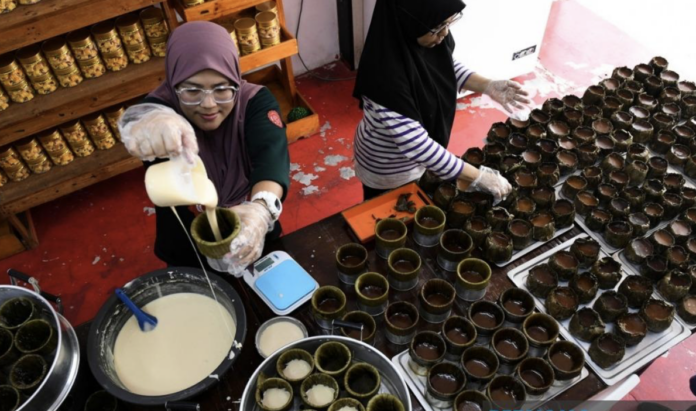BUKIT MERTAJAM, Feb 4 – ”Nian Gao,” or ‘Kuih Bakul,’ holds a special place in the Chinese New Year celebration, and for Nur Farrah Diba Azhar, 34, it’s not just a traditional delicacy, it’s a family legacy.
Running a kitchen in Bandar Perda that specialises in crafting these glutinous rice cakes and mooncakes, she considers herself fortunate to have inherited recipes rooted in her Chinese descent through her mother.
Before launching her business six years ago, she learned the art of creating these delectable treats from her late grandfather Teh Naik Ming and a Chinese neighbour.
While she sells kuih bakul throughout the year, the demand spikes during Chinese New Year, reaching 3,500 to 4,500 pieces and her business has expanded beyond the physical shop in Bandar Perda, with Farrah leveraging social media platforms like TikTok for online sales.
“I can deliver these traditional treats anywhere, even to Singapore and assure their freshness for up to a week without refrigeration,”said Farrah who ensures that her kuih bakul, a hallmark of the Chinese community, adheres to halal practices.
Sharing the intricacies of crafting kuih bakul, Nur Farrah describes the process as a meticulous art where no shortcuts can be taken.
“Every detail is crucial, as neglecting even the slightest aspect can result in a watery and flat outcome,” said the mother of one.
To ensure the quality of her kuih bakul, she emphasises the use of natural ingredients, with banana leaves serving as wrappers to enhance the original aroma of this traditional delicacy.
“The process begins with grinding the rice to create a batter, and what sets my recipe apart is the addition of my homemade groundnut oil and this special touch not only imparts a richer flavour but also adds body and a glossy finish to the kuih bakul.
“Next, the mixture will be steamed for 16 hours from 8 am to midnight using a gas stove and every day we can only produce 200 pieces of kuih bakul,” said Nur Farrah who opts for an iron mold instead of a plastic one to preserve the authentic smell, taste and texture.
She said the process of making a kuih bakul takes seven days because it is necessary to ensure that it is completely dried, otherwise it will get mouldy while the manufacturing process must be meticulous and clean.
Nur Farrah personally handles every aspect, from mixing the batter to wrapping, while her employees assist with utensil preparation and monitoring.
She said in the process of learning, she has imbibed the cultural discipline associated with making this traditional cake.
“Taboos during the process include maintaining silence to instill focus, creating a serene atmosphere for optimal outcomes,” she said.
In the meantime, she said the diversity of race and cultures in Malaysia should be manifested by learning about the cuisine of other communities and indirectly, it can clearly create a spirit of unity through gastronomy.
“My main intention of learning the secrets of making and selling kuih bakul is to share the joy of eating kuih of the Chinese community.
“So I think this is an opportunity in business as well as an effort to promote unity through communal food,” said Nur Farrah who has the support of her three siblings as well as her husband.
















